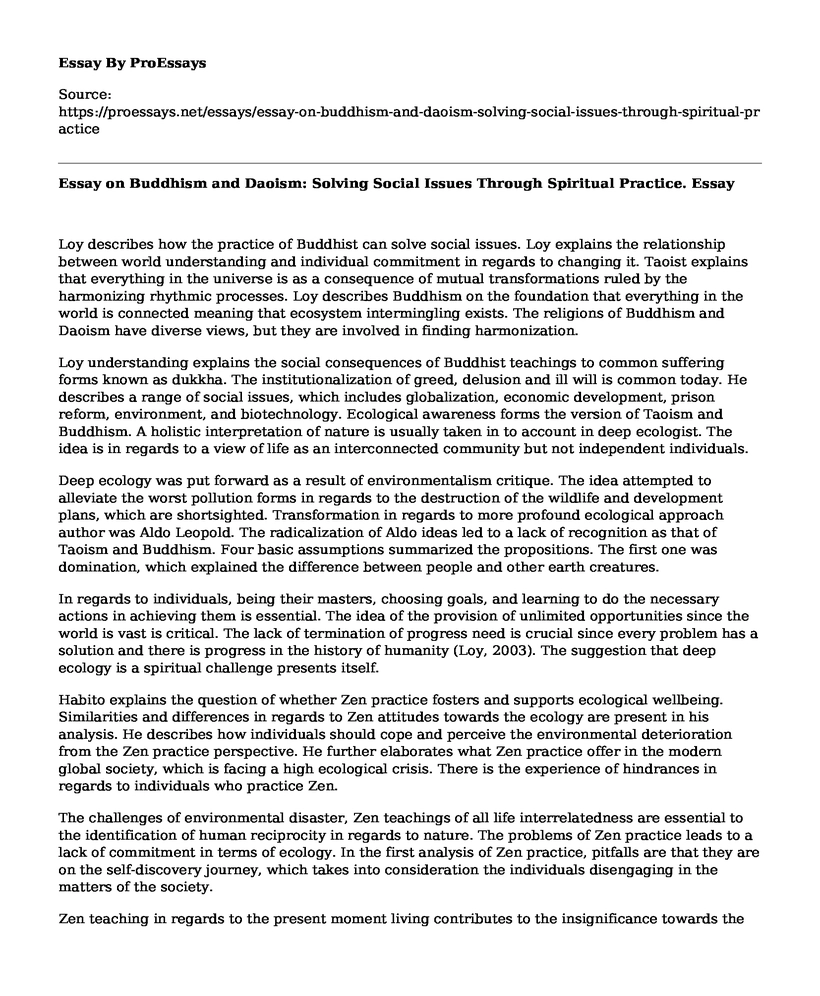Loy describes how the practice of Buddhist can solve social issues. Loy explains the relationship between world understanding and individual commitment in regards to changing it. Taoist explains that everything in the universe is as a consequence of mutual transformations ruled by the harmonizing rhythmic processes. Loy describes Buddhism on the foundation that everything in the world is connected meaning that ecosystem intermingling exists. The religions of Buddhism and Daoism have diverse views, but they are involved in finding harmonization.
Loy understanding explains the social consequences of Buddhist teachings to common suffering forms known as dukkha. The institutionalization of greed, delusion and ill will is common today. He describes a range of social issues, which includes globalization, economic development, prison reform, environment, and biotechnology. Ecological awareness forms the version of Taoism and Buddhism. A holistic interpretation of nature is usually taken in to account in deep ecologist. The idea is in regards to a view of life as an interconnected community but not independent individuals.
Deep ecology was put forward as a result of environmentalism critique. The idea attempted to alleviate the worst pollution forms in regards to the destruction of the wildlife and development plans, which are shortsighted. Transformation in regards to more profound ecological approach author was Aldo Leopold. The radicalization of Aldo ideas led to a lack of recognition as that of Taoism and Buddhism. Four basic assumptions summarized the propositions. The first one was domination, which explained the difference between people and other earth creatures.
In regards to individuals, being their masters, choosing goals, and learning to do the necessary actions in achieving them is essential. The idea of the provision of unlimited opportunities since the world is vast is critical. The lack of termination of progress need is crucial since every problem has a solution and there is progress in the history of humanity (Loy, 2003). The suggestion that deep ecology is a spiritual challenge presents itself.
Habito explains the question of whether Zen practice fosters and supports ecological wellbeing. Similarities and differences in regards to Zen attitudes towards the ecology are present in his analysis. He describes how individuals should cope and perceive the environmental deterioration from the Zen practice perspective. He further elaborates what Zen practice offer in the modern global society, which is facing a high ecological crisis. There is the experience of hindrances in regards to individuals who practice Zen.
The challenges of environmental disaster, Zen teachings of all life interrelatedness are essential to the identification of human reciprocity in regards to nature. The problems of Zen practice leads to a lack of commitment in terms of ecology. In the first analysis of Zen practice, pitfalls are that they are on the self-discovery journey, which takes into consideration the individuals disengaging in the matters of the society.
Zen teaching in regards to the present moment living contributes to the insignificance towards the future. The idea does not add to the individuals only but also the future of the earth living beings. The Zen teachings and writings in regards to living in the present moments can misguide on the idea of lack of concentration of the characteristic feature of the earth. The experience of awakening also contributes to the matters of the environment (Tucker & Williams, 1997). The encounter leads to a lack of active engagement in issues concerning ecology. Zen awakening leads to the overcoming of individual consciousness. Both Loy Habito analysis recognize environmental values and consider them as related to Zen teachings impacting the relationship between human beings and the natural world.
References
Loy, D. (2003). The great awakening: A Buddhist social theory. New York, NY: Simon and Schuster.
Tucker, M. E., & Williams, D. R. (1997). Buddhism and ecology: the interconnection of dharma and deeds. Cambridge, Mass: Harvard University Center for the Study of World Religions.
Cite this page
Essay on Buddhism and Daoism: Solving Social Issues Through Spiritual Practice.. (2022, Dec 29). Retrieved from https://proessays.net/essays/essay-on-buddhism-and-daoism-solving-social-issues-through-spiritual-practice
If you are the original author of this essay and no longer wish to have it published on the ProEssays website, please click below to request its removal:
- God and Cosmology Essay Example
- Being Peace by Thich Nhat Hanh - Essay Sample
- Fetal Abortion Christian View Essay Example
- Essay on Reaching Out: Evangelizing to Non-Believers and Non-Practicing Christians
- Essay Sample on Faith and Love: The Cornerstones of Christianity
- Essay Example on Deborah Saves Israel: The Story of Ehud's Passing
- Essay Example on Mahayana Buddhism: Ritualism, Ethics, Metaphysics & Cosmology







